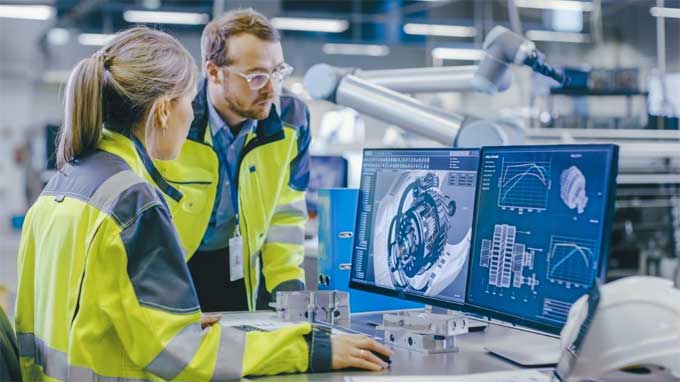
Describe Engineering for Manufacturing (EFM) for a new Prototype Design Service

At a prototype design services firm, engineering for manufacturing or EFM refers to the development of new products. Making things efficiently, effectively, and economically is the goal of manufacturing engineering.
Everything you interact with, from your clothes to your device, is a product of manufacturing. A manufacturing engineer is an essential member of these power teams, which include designers, technicians, and engineers.
Define Engineering for Manufacturing (EFM)
A high quality product is created by implementing engineering for manufacturing (EFM). It is the job of manufacturing engineers to design production facilities and suggest the right equipment for the task at hand, including robots, sorting equipment, welding, and lasers.
In order to develop a profitable product, production engineers balance the manufacturing process and the budget. Keeping up with technological advances is critical for manufacturing facilities to remain flexible and efficient for years to come.
Importance of Engineering for Manufacturing
By using new procedures, equipment, or software, manufacturing engineers can enhance quality control or operational efficiency at existing facilities. Manufacturers may also supervise a current facility, robots, or workers assembling parts, depending on their specialty. It is possible to assess how a software upgrade of older equipment will change the current production process.
It is common to confuse manufacturing engineering with industrial engineering. The main focus of an industrial engineer is to improve efficiency by streamlining processes between machines and people. Manufacturing engineers are more interested in identifying the best equipment and machinery to develop a product or system.
Engineering for Manufacturing Workflow
Design Product
Assemblies, components, and subsystems of smart-phones are designed using CAD drawings and models based on customer needs. Manufacturing engineers are involved almost right from the beginning, pointing out ways to make fabrication faster, easier, and cheaper by improving the design.
Also, manufacturing engineers have the opportunity to detect and resolve serious manufacturing issues before they become a problem in production.
System & Process Design
The manufacturing engineer will develop the processes for fabricating every component of the smart-phone after designing its parts. An expert manufacturing engineer can identify essential parameters and steps for producing quality parts efficiently based on his or her experience in manufacturing processes such as injection molding, casting, forming, welding, and machining.
As well as establishing the supply chain for raw materials and components from outsourced sources. For efficient and orderly production, the factory engineer determines the number of workers and machines required.
Quality Control
As production begins, the manufacturing engineer will continue to measure and analyze the manufacturing process to make sure everything runs smoothly and on schedule. Through the use of tools such as robotics, automation, information systems, and computer simulations, the manufacturing engineer will also map out and implement enhancements that will reduce costs and lead times while improving quality.
Manufacturing engineers can improve individual product lines, processes, factories, and entire companies with principle based philosophies such as Six Sigma and Total Quality Management. Manufacturing engineers play a vital role in the production process by never finishing their work.
EFM Roles
Planning manufacturing processes is an essential part of engineering for manufacturing. Experts may discuss how to build a particular product, estimate project costs based on different systems, or research new machines and processes during these meetings.
Observation of equipment at other factories or approval of progress at developing manufacturing facilities may also be carried out by a manufacturing engineer. Additionally, they may use technology to make virtual changes to manufacturing layouts before creating the actual product.
A manufacturing engineer usually works forty hours a week and works with other teams. An additional number of hours may be needed if a new product is being developed or if new equipment is being evaluated. As a result of these extra hours, an urgent issue will be resolved if a breakdown occurs at unexpected times.
EFM Responsibilities
? Be involved in the entire manufacturing process, from the planning to the packaging of the finished product.
? Reduce costs, improve turnaround, and streamline production by examining the flow and manufacturing equipment's process.
? Provide a marketing edge to a product by understanding cost effective and efficient development methods.
? Plan final manufacturing processes based on prototypes, which are often made electronically.
? Assembly, packaging, and shipping facilities utilize numerical and programmable controllers, vision systems, and robots.
Engineering for Manufacturing Merits
Companies that provide engineering for manufacturing services can provide clients with the solutions they need. Companies that specialize in engineering for manufacturing can offer a range of services, including: Mechanical and electrical engineering, marketing. Turnkey jobs are available, as well as patent and product research, product analysis and simulation, and product certification and testing.
Individuals, corporations, and partnerships may find that outsourcing some or all of their production needs to engineering for manufacturing companies can result in more profits.
To learn more, watch the following video tutorial.
Video Source: UBC Engineering
For management, knowing when to repair or replace equipment is critical since return on investment is crucial. An evaluation of the cost of outsourcing and even the cost of replacing or repairing equipment is included in the cost analysis.
Wrapping it Up
Various products are developed by engineers in manufacturing companies, including cup holders, Bluetooth headsets, car seats, and boat seating systems. Developing a plan or product requires manufacturing engineers to find the right machinery and equipment. The client can also benefit from saving money when outsourcing production needs to engineering.


